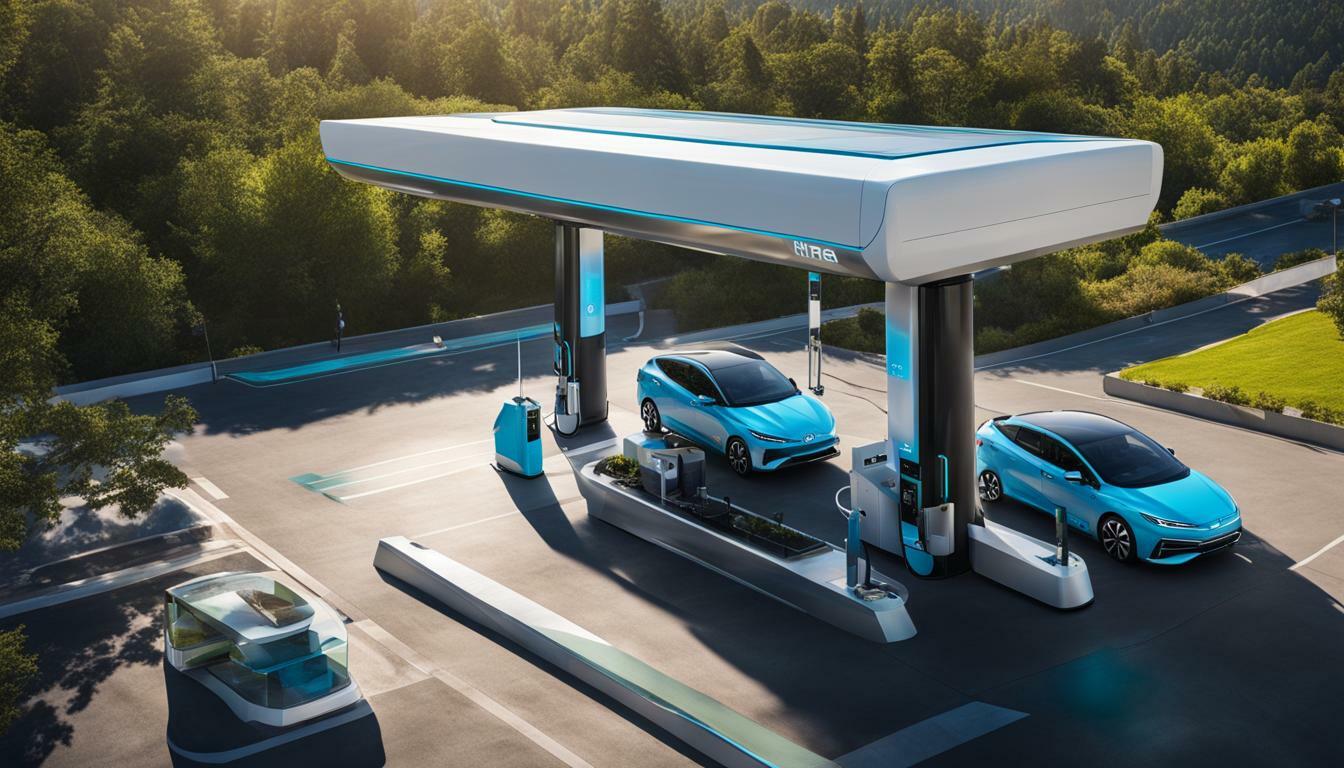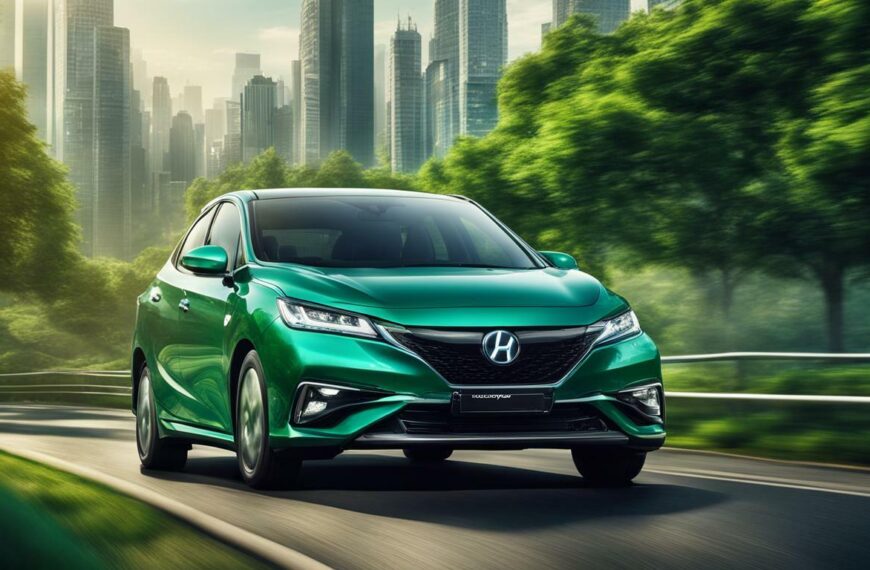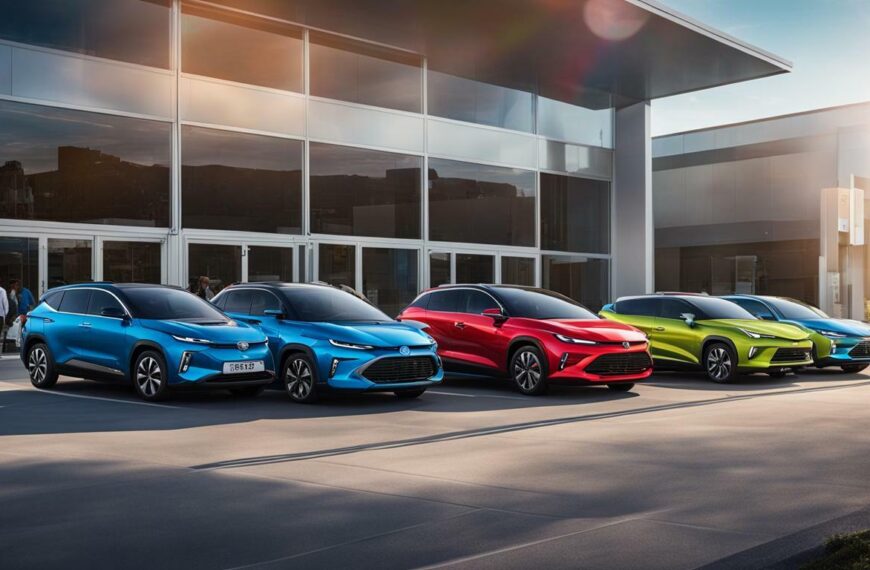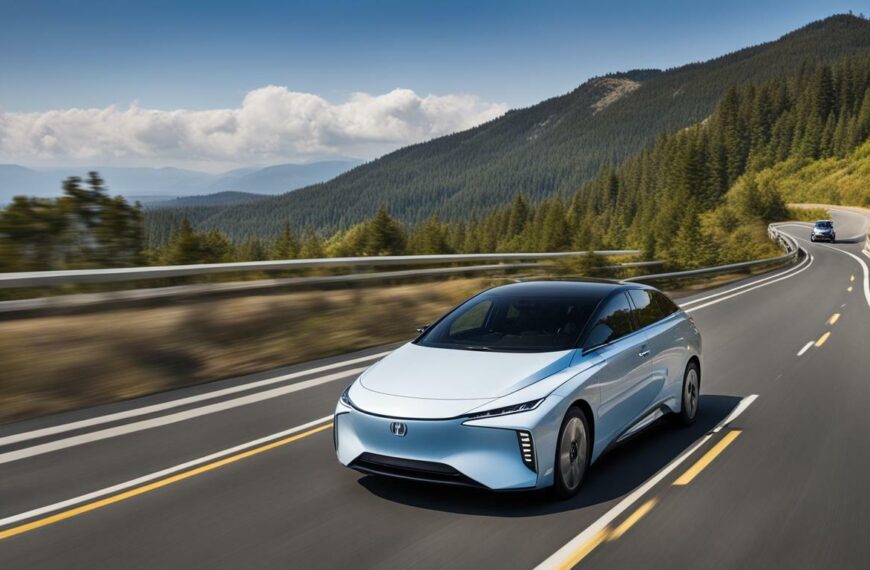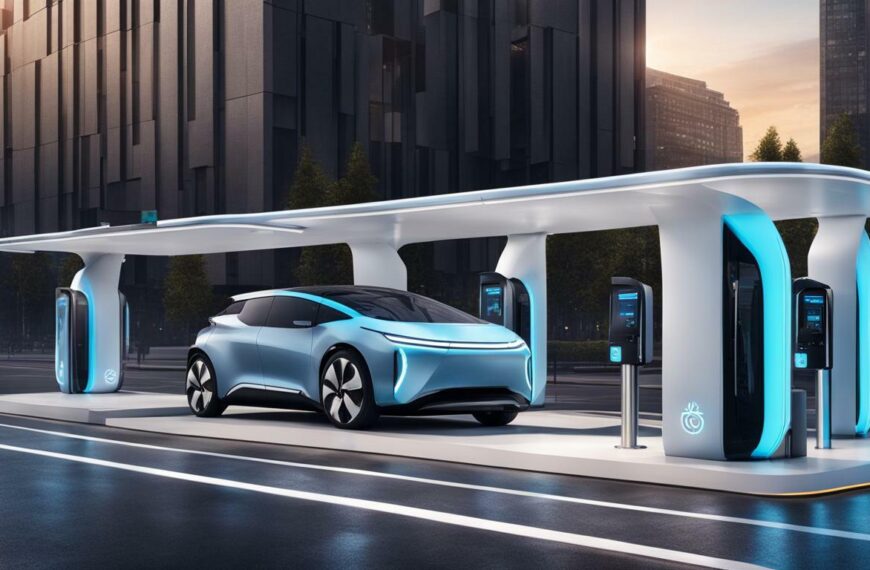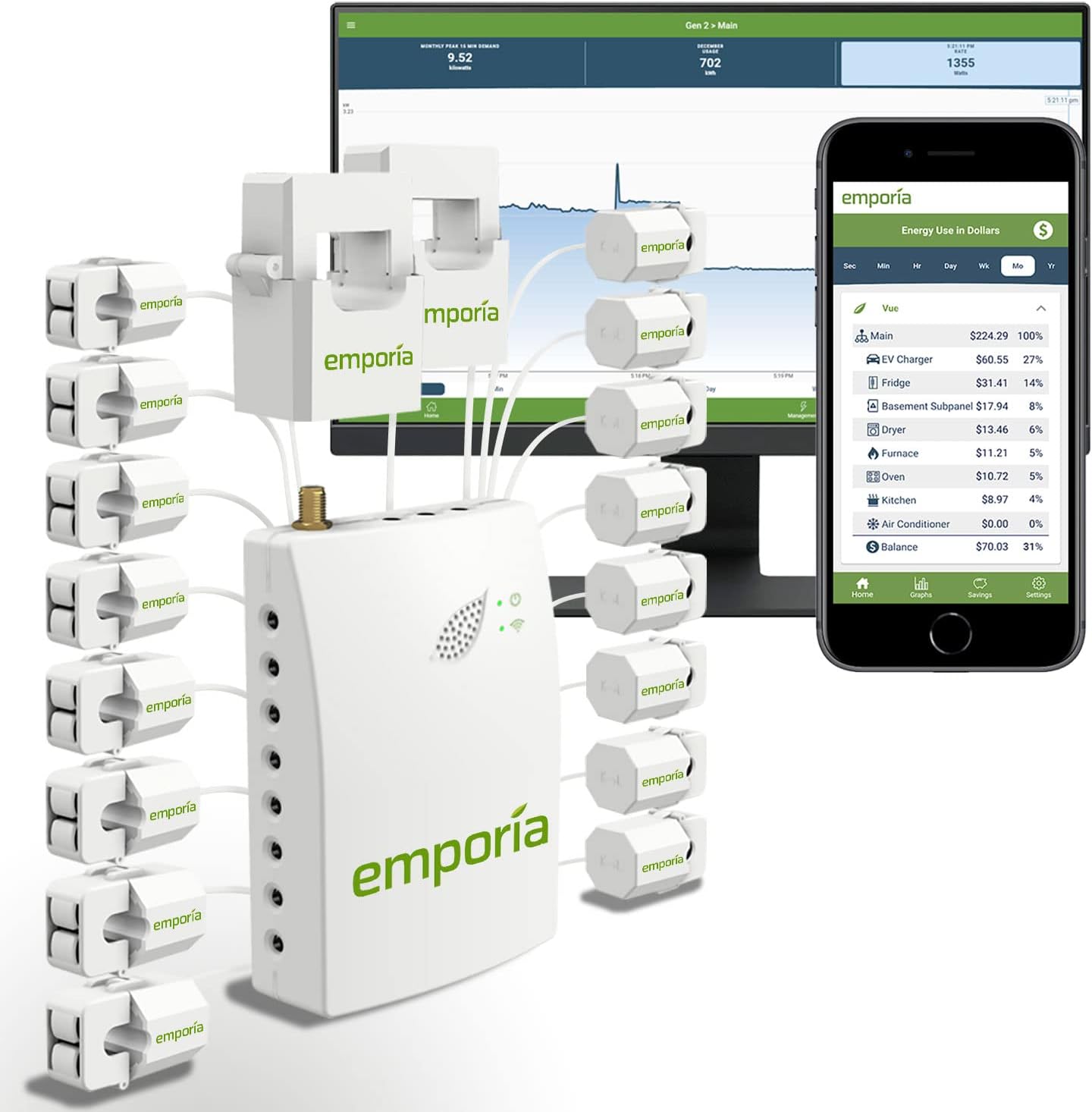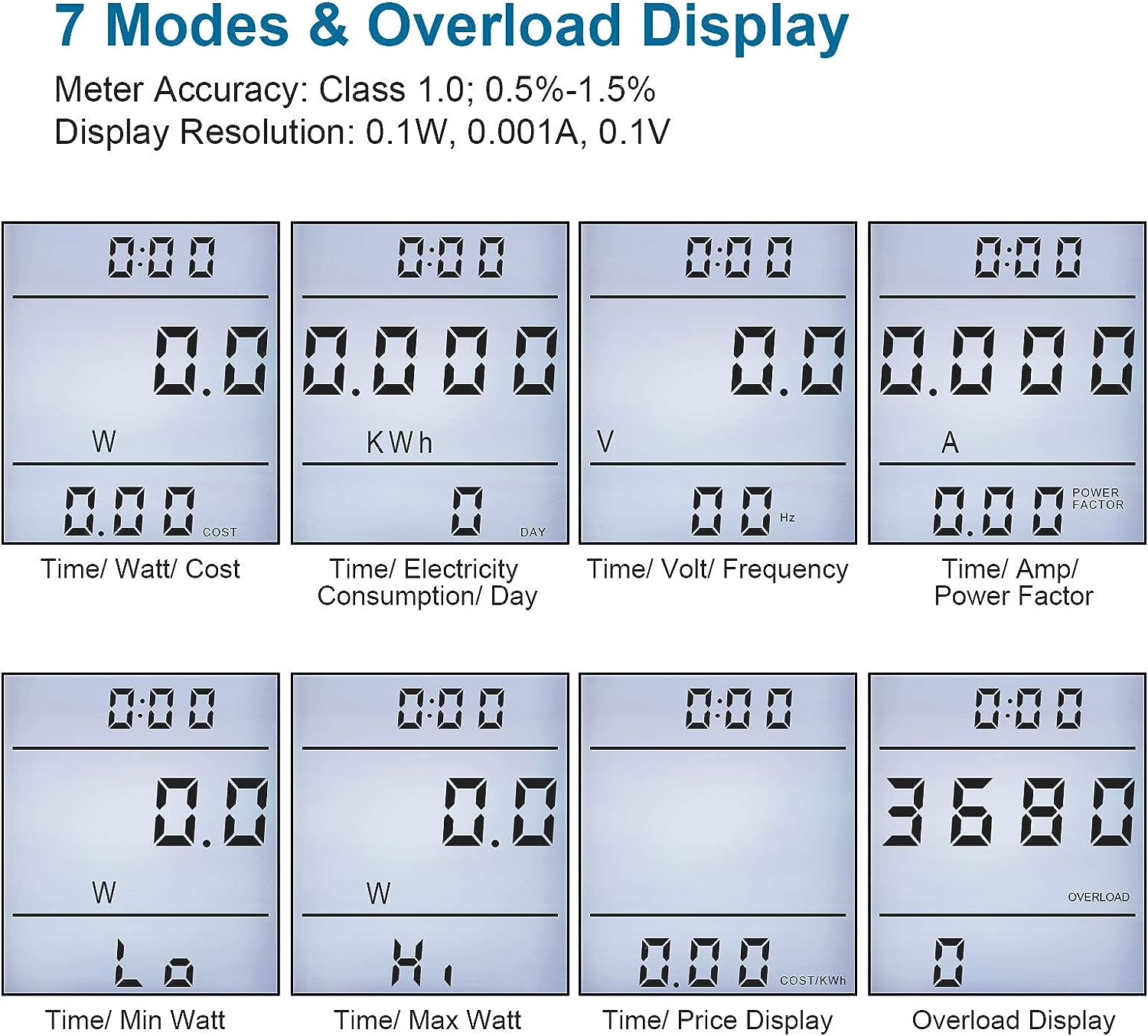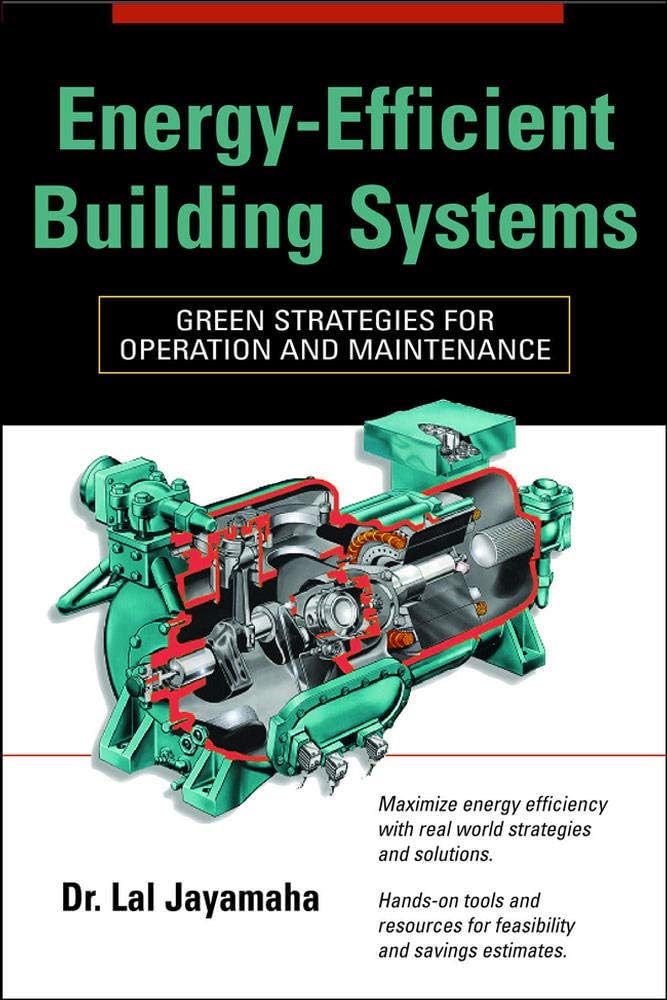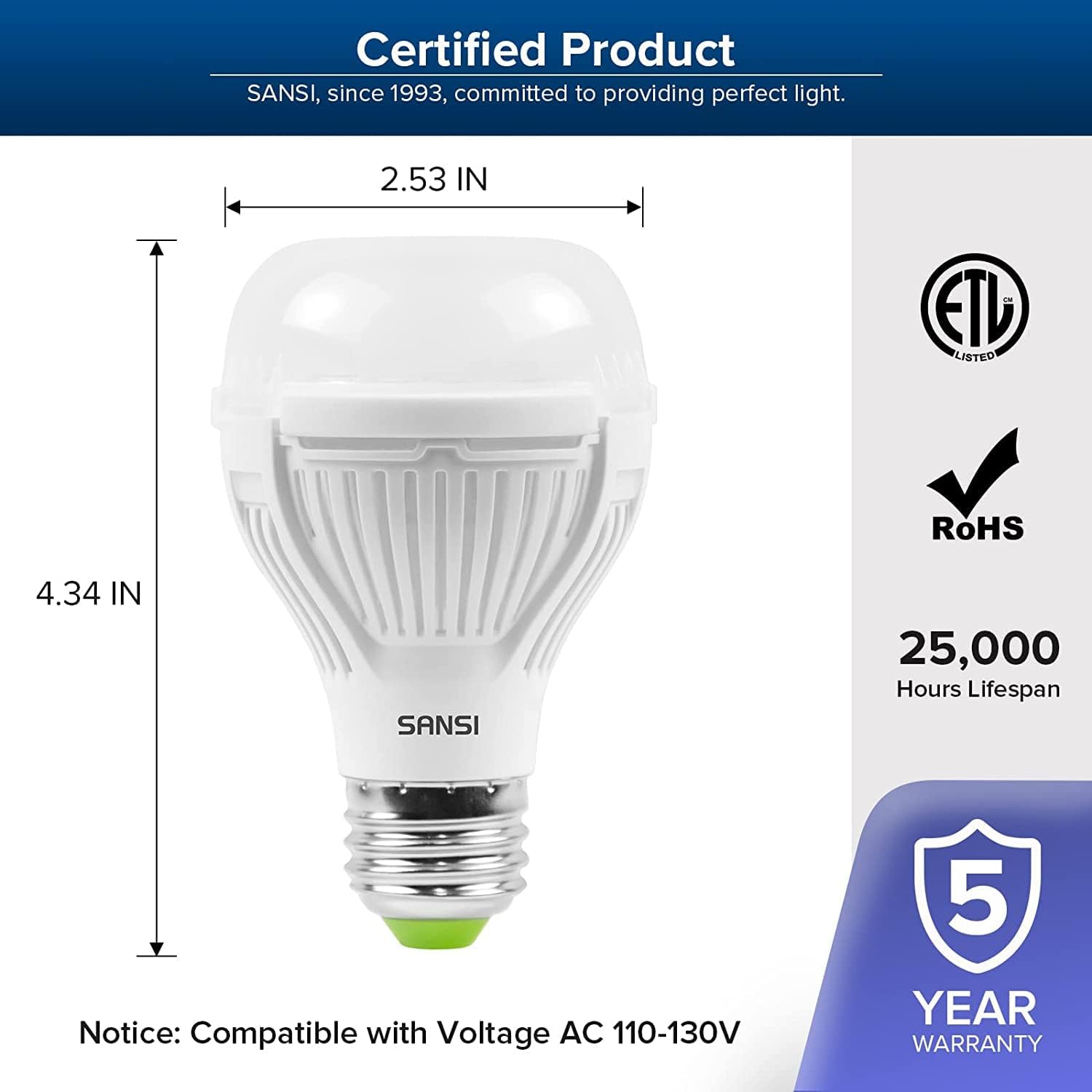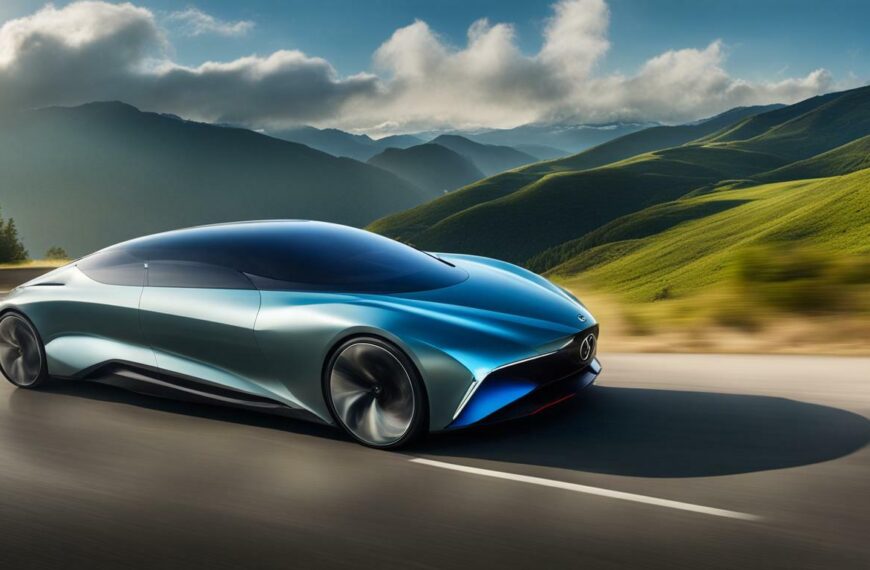Hydrogen cars offer a solution to range anxiety through their fast and efficient and fast hydrogen refueling process. As the demand for sustainable transportation grows, hydrogen fuel cell vehicles have emerged as an alternative to traditional gasoline and diesel engines. These vehicles not only offer reduced emissions but also address the concern of limited driving range, thanks to their ability to refuel quickly.
Key Takeaways:
- Hydrogen cars alleviate range anxiety with their fast and efficient refueling process.
- The lack of hydrogen refueling stations in Europe is hindering the widespread adoption of hydrogen cars.
- Germany leads the market with the highest number of hydrogen fueling stations.
- Hydrogen cars are touted as a solution to emissions from gasoline and diesel engines.
- Despite their advantages, higher costs compared to electric vehicles limit their popularity.
The Need for Hydrogen Refueling Infrastructure in Europe
Despite the benefits of hydrogen cars, the lack of refueling stations in Europe presents a major hurdle for their widespread adoption. Currently, there are only 172 hydrogen fueling stations in Europe, which is not enough to support the growing demand for hydrogen cars. This shortage of refueling infrastructure leads to range anxiety among potential buyers, as they worry about the availability of fuel for longer journeys.
Germany, with its 69 hydrogen fueling stations, is leading the market in Europe. However, other countries in Europe are lagging behind, and this lack of a comprehensive refueling network limits the potential for hydrogen cars to become a viable alternative to traditional gasoline or diesel vehicles.
In order to address this issue, the industry is actively seeking support from the European Union and national governments. Investment in hydrogen refueling infrastructure is crucial to overcome the challenges faced by hydrogen cars. By providing financial incentives and regulatory support, governments can help accelerate the development of a widespread hydrogen refueling network.
Building a robust hydrogen refueling infrastructure will not only alleviate range anxiety for current and potential hydrogen car owners but also contribute to reducing emissions from transportation. Hydrogen cars produce zero tailpipe emissions, offering a cleaner alternative to conventional vehicles. The availability of a convenient and reliable refueling network will encourage more people to choose hydrogen cars, ultimately leading to a significant reduction in greenhouse gas emissions.
| Country | Number of Hydrogen Fueling Stations |
|---|---|
| Germany | 69 |
| United Kingdom | 17 |
| Netherlands | 17 |
| France | 11 |
| Spain | 8 |
The table above showcases the current status of hydrogen fueling stations in Europe. While Germany leads the market, other countries still have a long way to go in terms of infrastructure development. Increased investment in hydrogen refueling stations across Europe is necessary to support the growth of hydrogen cars and create a sustainable future for transportation.
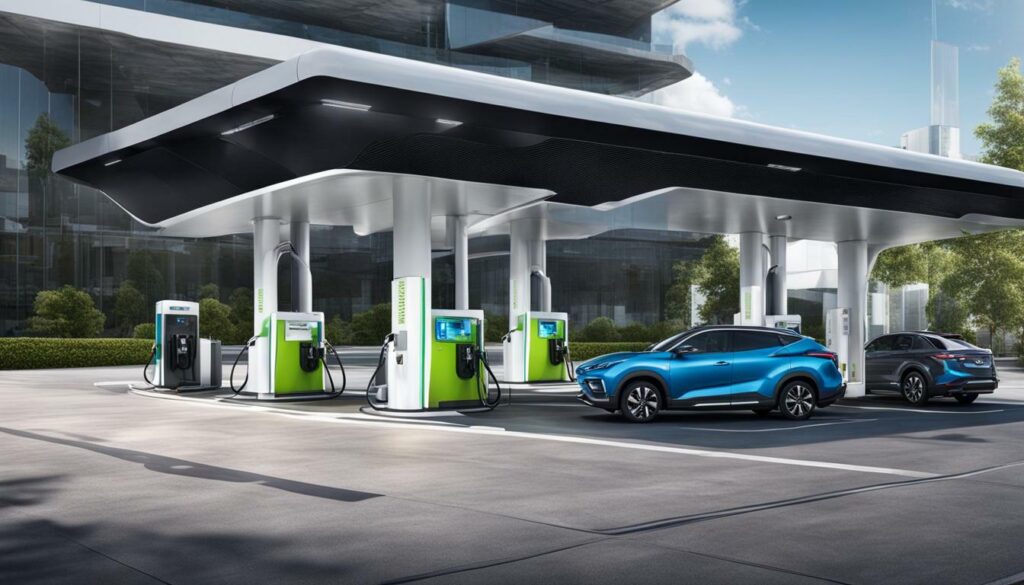
With the support and collaboration of the European Union, national governments, and private industry, the establishment of a comprehensive hydrogen refueling infrastructure in Europe is within reach. By addressing the challenges related to range anxiety and expanding the availability of refueling stations, we can pave the way for a future where hydrogen cars play a significant role in reducing emissions and creating a greener transportation system.
Seeking Support from the European Union and National Governments
In order to address the shortage of hydrogen refueling stations, the hydrogen car industry is seeking assistance and investments from the European Union and national governments. Currently, there are only 172 hydrogen stations in Europe, making it challenging for hydrogen car users to find convenient refueling options. The lack of infrastructure is a major barrier to the widespread adoption of hydrogen cars, leading to range anxiety and hindering sales.
Hydrogen cars offer numerous advantages, including fast refueling times and reduced emissions. However, without the necessary refueling infrastructure, these benefits cannot be fully realized. That’s why the industry is actively engaging with policymakers, urging them to recognize the potential of hydrogen cars and invest in the development of hydrogen refueling networks.
By working together with the European Union and national governments, the hydrogen car industry aims to establish a robust hydrogen refueling infrastructure that supports the increasing demand for clean and sustainable transportation. This would not only alleviate range anxiety for hydrogen car users but also contribute to the overall reduction of greenhouse gas emissions in the transport sector.
| Hydrogen Fueling Stations in Europe | Number of Stations |
|---|---|
| Germany | 69 |
| United Kingdom | 19 |
| Netherlands | 17 |
As shown in the table above, Germany is leading the market with 69 hydrogen fueling stations, followed by the United Kingdom with 19 stations and the Netherlands with 17 stations. While progress has been made, these numbers are still insufficient to meet the demand for hydrogen cars across Europe. Continued collaboration between industry stakeholders and governments is crucial to accelerate the expansion of the hydrogen refueling network and create a sustainable future for hydrogen-powered transportation.
The Current Status of Hydrogen Stations in Europe
Germany leads the European market with its 69 hydrogen fueling stations, paving the way for hydrogen car adoption in the region. However, there is still a significant need for more hydrogen refueling infrastructure to support the growing demand for these environmentally friendly vehicles.
In total, there are currently 172 hydrogen stations in Europe, according to the European Alternative Fuels Observatory. While this is a positive step towards establishing a hydrogen refueling network, it is not enough to fully address the range anxiety experienced by hydrogen car users.
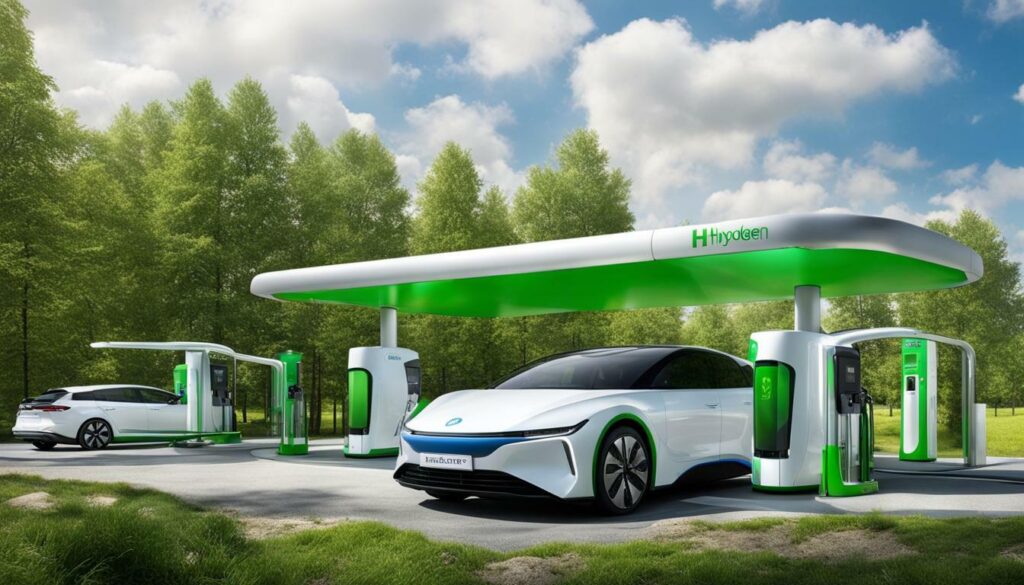
A comprehensive network of hydrogen fueling stations is crucial for the widespread adoption of hydrogen cars, as it would provide users with the confidence to travel long distances without the fear of running out of fuel. This is especially important in Europe, where countries are pushing for more sustainable transportation options to reduce emissions.
| Country | Number of Hydrogen Fueling Stations |
|---|---|
| Germany | 69 |
| Netherlands | 21 |
| United Kingdom | 16 |
| France | 16 |
| Spain | 6 |
As shown in the table above, Germany is leading the way in hydrogen infrastructure development, with the highest number of fueling stations. However, other European countries such as the Netherlands, United Kingdom, France, and Spain are also making progress in establishing their own hydrogen refueling networks.
Investment in hydrogen refueling infrastructure remains crucial to address the challenges faced by hydrogen cars and accelerate their adoption across Europe. With more refueling stations, hydrogen cars can become a viable and sustainable alternative to traditional gasoline and diesel vehicles, contributing to cleaner air and reduced greenhouse gas emissions.
Advantages of Hydrogen Cars and Refueling Time
Apart from being environmentally friendly, hydrogen cars offer the advantage of quick refueling, addressing the concerns surrounding extended refueling time. Unlike electric vehicles that require a longer charging time, hydrogen fuel cell vehicles can be refueled in just a few minutes, similar to traditional gasoline cars. This eliminates the need for long waiting times at charging stations and provides a more convenient and efficient experience for hydrogen car users.
Hydrogen refueling time is a crucial factor in promoting widespread adoption of hydrogen cars, especially in regions where refueling infrastructure is still developing, such as Europe. With fast refueling, drivers can have peace of mind knowing that they can quickly replenish their vehicle’s energy and continue their journey without range anxiety. This convenience is particularly important for long-distance travel, where frequent refueling stops can be time-consuming and disrupt travel plans.
To illustrate the advantage of quick refueling, let’s compare it to electric vehicles. While electric cars offer the benefit of home charging, their charging time can range from several hours to even a whole day, depending on the charging station’s power output. This extended charging time can be inconvenient and impractical, especially for drivers who are always on the go. In contrast, hydrogen cars provide a refueling experience similar to filling up with gasoline, allowing drivers to get back on the road swiftly.
According to a study conducted by the German National Organization for Hydrogen and Fuel Cell Technology, “refueling time is an important factor for consumers when considering hydrogen cars. The ability to refuel quickly helps alleviate range anxiety and makes hydrogen cars a more attractive option for daily use and long-distance travel.”
While refueling infrastructure for hydrogen cars is still in its early stages, the advantages of quick refueling time position hydrogen vehicles as a promising solution for sustainable transportation. As the industry continues to invest in expanding the hydrogen refueling network in Europe and governments provide crucial support, the availability of hydrogen stations will increase, further promoting the adoption of hydrogen cars and easing concerns over refueling time.
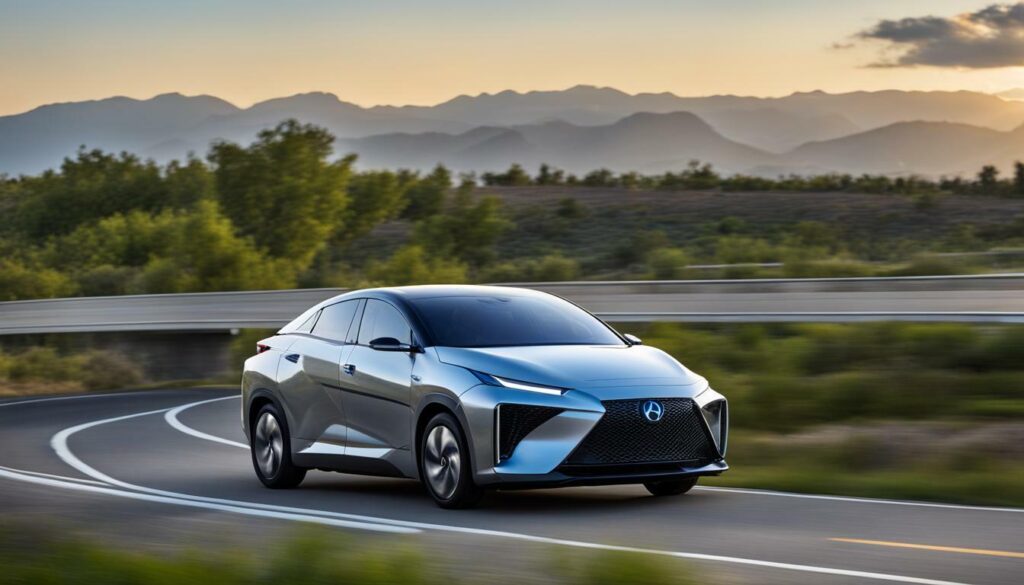
- Hydrogen cars offer the advantage of quick refueling, eliminating concerns about extended refueling time.
- Quick refueling time provides convenience and efficiency for hydrogen car users, similar to traditional gasoline cars.
- Compared to electric vehicles, which require longer charging times, hydrogen cars allow drivers to refuel in just a few minutes.
- Fast refueling reduces range anxiety and makes hydrogen cars more suitable for long-distance travel.
- The expansion of hydrogen refueling infrastructure will further promote the adoption of hydrogen cars.
As hydrogen cars continue to evolve and refueling infrastructure expands, the advantages of quick refueling time will play a crucial role in their growing popularity. With the convenience and efficiency they offer, hydrogen cars have the potential to reshape sustainable transportation and contribute to a greener future.
Comparison with Electric Vehicles
While hydrogen cars offer unique benefits, such as fast refueling, they still face challenges in competing with electric vehicles due to their higher costs. The higher cost of hydrogen cars can be attributed to several factors, including the limited production scale and the high cost of infrastructure development.
According to a report by the International Council on Clean Transportation, the price of hydrogen fuel cell vehicles is currently higher than that of their electric counterparts. This can be partially explained by the complexity of the hydrogen fuel cell technology, which requires expensive materials such as platinum for catalysts. Additionally, the cost of building and maintaining hydrogen refueling stations is considerably higher compared to electric charging infrastructure.
Despite these challenges, hydrogen cars have their advantages. One major advantage is their fast refueling time, which is comparable to filling up with gasoline. This eliminates the need for extended charging periods, making them more convenient for long-distance trips. Moreover, hydrogen fuel cells offer higher energy density compared to batteries, resulting in longer driving ranges and reducing the need for frequent recharging.
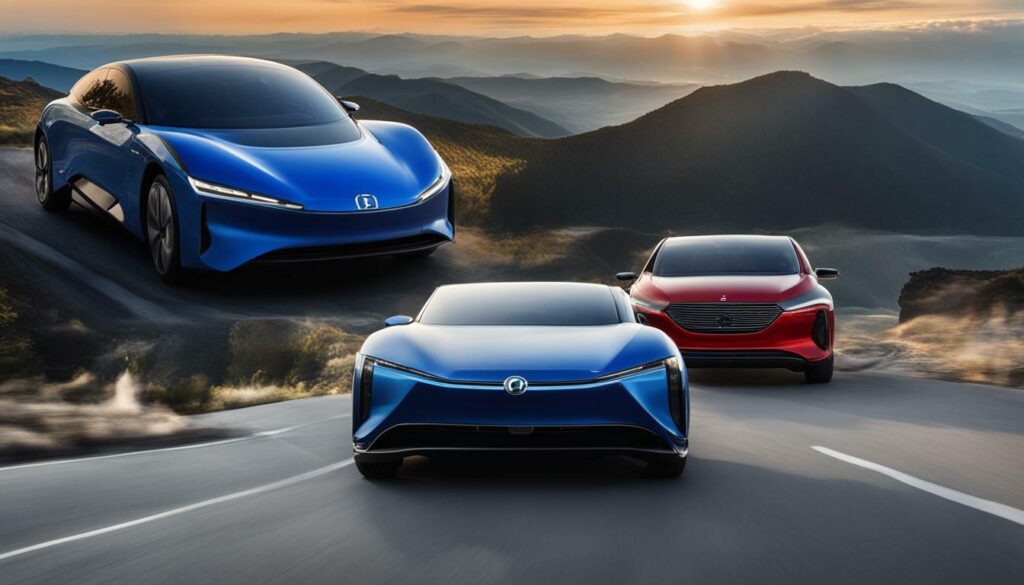
However, the higher costs associated with hydrogen cars remain a hurdle for widespread adoption. As the industry continues to develop and scale up production, it is expected that economies of scale will drive down costs and make hydrogen cars more competitive in the market.
Advantages of Hydrogen Cars:
- Fast refueling time
- Long driving ranges
- Potential for zero-emission transportation
Challenges of Hydrogen Cars:
- Higher costs compared to electric vehicles
- Limited refueling infrastructure
- Dependency on hydrogen production and supply chain
Despite the current challenges, hydrogen cars hold promise as a clean and efficient transportation solution. Continued investment in research, development, and infrastructure is essential to drive down costs and increase the availability of refueling stations. By addressing these challenges, hydrogen cars can become a viable alternative to traditional gasoline and diesel vehicles, contributing to a more sustainable future.
The Promise of Hydrogen Cars for Emission Reduction
Hydrogen cars hold great promise in addressing the emissions from traditional gasoline and diesel engines, contributing to a cleaner and greener future. With growing concerns about climate change and air pollution, finding alternative and sustainable transportation solutions has become a top priority. Hydrogen cars, powered by fuel cells that convert hydrogen gas into electricity, offer a viable alternative to traditional combustion engines.
One of the key advantages of hydrogen cars is their ability to significantly reduce emissions. Unlike gasoline and diesel engines, hydrogen fuel cells produce zero tailpipe emissions, emitting only water vapor and heat. This makes hydrogen cars an attractive option for environmentally conscious individuals and organizations looking to minimize their carbon footprint.
To put things into perspective, conventional gasoline and diesel engines are major contributors to greenhouse gas emissions. According to the Environmental Protection Agency (EPA), transportation accounts for nearly 30% of greenhouse gas emissions in the United States, with cars and light trucks being the primary source. By transitioning to hydrogen cars, we can significantly reduce these emissions and mitigate the impact of transportation on the environment.
| Hydrogen Cars | Gasoline and Diesel Engines |
|---|---|
| Zero tailpipe emissions | Significant greenhouse gas emissions |
| Water vapor and heat as byproducts | Harmful pollutants, such as carbon monoxide and nitrogen oxides |
| Contributes to a cleaner and greener future | Contributes to air pollution and climate change |
By adopting hydrogen cars and investing in the necessary refueling infrastructure, we can accelerate the transition to a sustainable transportation system. However, it is important to note that the success of hydrogen cars depends heavily on the availability of hydrogen refueling stations. Without a reliable and widespread refueling network, the adoption of hydrogen cars will be limited.
It is clear that hydrogen cars have the potential to revolutionize the automotive industry and significantly reduce emissions. However, to fully realize this potential, it is essential to invest in the development of hydrogen refueling infrastructure. Only then can we truly embrace the promise of hydrogen cars and pave the way for a cleaner, greener future.

The availability of a well-established hydrogen refueling infrastructure plays a crucial role in alleviating range anxiety and boosting sales of hydrogen cars. With the current challenges faced by hydrogen cars in Europe due to the lack of sufficient refueling stations, potential buyers are hesitant to invest in this technology. According to data, there are currently 172 hydrogen fueling stations in Europe, with Germany leading the market with 69 stations. However, this number is not enough to support widespread adoption of hydrogen cars. As a result, range anxiety, the fear of running out of fuel and being unable to find a refueling station, persists among potential buyers.
Range anxiety is a significant factor that influences the decision-making process of consumers when considering hydrogen cars. The fear of being stranded without access to a refueling station inhibits individuals from fully embracing this environmentally friendly transportation option. A comprehensive hydrogen refueling infrastructure, with strategically placed stations, would alleviate these concerns and provide consumers with the confidence to embrace hydrogen cars as a viable alternative to gasoline and diesel vehicles.
In order to drive the adoption of hydrogen cars, efforts are being made to seek support from the European Union and national governments for the development of a robust hydrogen refueling network. By investing in the necessary infrastructure, governments can demonstrate their commitment to sustainable transportation and address the concerns of potential buyers. Such support would not only boost the sales of hydrogen cars but also contribute to the overall reduction of emissions from traditional gasoline and diesel engines.
| Country | Number of Hydrogen Fueling Stations |
|---|---|
| Germany | 69 |
| United Kingdom | 18 |
| Netherlands | 17 |
| France | 13 |
As seen in the table above, Germany currently has the highest number of hydrogen fueling stations in Europe. However, even the leading market needs further expansion to meet the growing demand for hydrogen cars. A well-established network of hydrogen stations, not only in Germany but throughout Europe, is essential for the mass adoption of this technology and the realization of its environmental benefits.
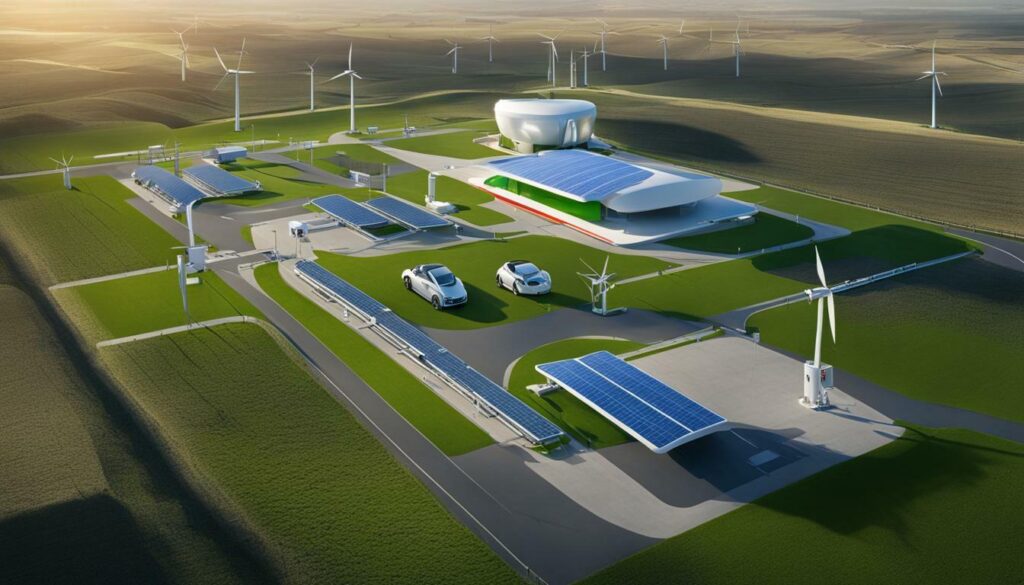
The Future of Hydrogen Refueling Technology
The future of hydrogen refueling technology holds promising advancements, including high-speed refueling options, making hydrogen cars even more convenient for users. As the demand for hydrogen cars continues to grow, the need for efficient refueling solutions becomes paramount. Technological innovations are playing a crucial role in addressing this challenge, paving the way for a more sustainable and accessible hydrogen infrastructure.
One of the key advancements in hydrogen refueling technology is the development of high-speed refueling stations. These stations are designed to significantly reduce refueling time, offering a comparable experience to traditional gasoline fill-ups. With high-speed refueling, hydrogen car owners can enjoy quicker stops at the pump, eliminating the inconvenience of long wait times and giving them greater peace of mind on long journeys.
To achieve high-speed refueling, engineers are refining the design and functionality of hydrogen dispensers. These advanced dispensers utilize improved cooling mechanisms and optimized flow rates to deliver hydrogen at a faster rate, ensuring a seamless refueling experience for users. The development of high-speed refueling infrastructure is essential for the widespread adoption of hydrogen cars, as it addresses one of the main concerns associated with this technology – the refueling time.
| Advantages of High-Speed Hydrogen Refueling |
|---|
| 1. Reduced refueling time: High-speed hydrogen refueling stations can significantly cut down the time required to refuel a hydrogen car, enhancing the overall convenience for users. |
| 2. Enhanced user experience: With shorter refueling stops, drivers can enjoy a more efficient and seamless journey, alleviating range anxiety and making hydrogen cars a more appealing choice. |
| 3. Increased accessibility: The availability of high-speed refueling stations makes hydrogen cars a viable option for consumers, as it eliminates concerns about longer refueling times and makes them suitable for daily commuting and long-distance travel. |
“High-speed hydrogen refueling stations are paving the way for a more convenient and accessible hydrogen infrastructure.”
Furthermore, efforts are underway to incorporate renewable energy sources into hydrogen refueling stations, making the refueling process more sustainable and environmentally friendly. By utilizing renewable energy, such as solar or wind power, to produce hydrogen, refueling stations can reduce their carbon footprint and contribute to cleaner transportation solutions. This integration of renewable energy with hydrogen refueling technology holds immense potential for creating a greener future.
In conclusion, the advancements in hydrogen refueling technology, including high-speed refueling options, are revolutionizing the way we refuel hydrogen cars. These innovations are addressing the challenges associated with range anxiety and refueling time, making hydrogen cars a more appealing and practical choice for consumers. With continued research and development, hydrogen refueling infrastructure is expected to grow, ensuring a sustainable and efficient hydrogen ecosystem for the future.
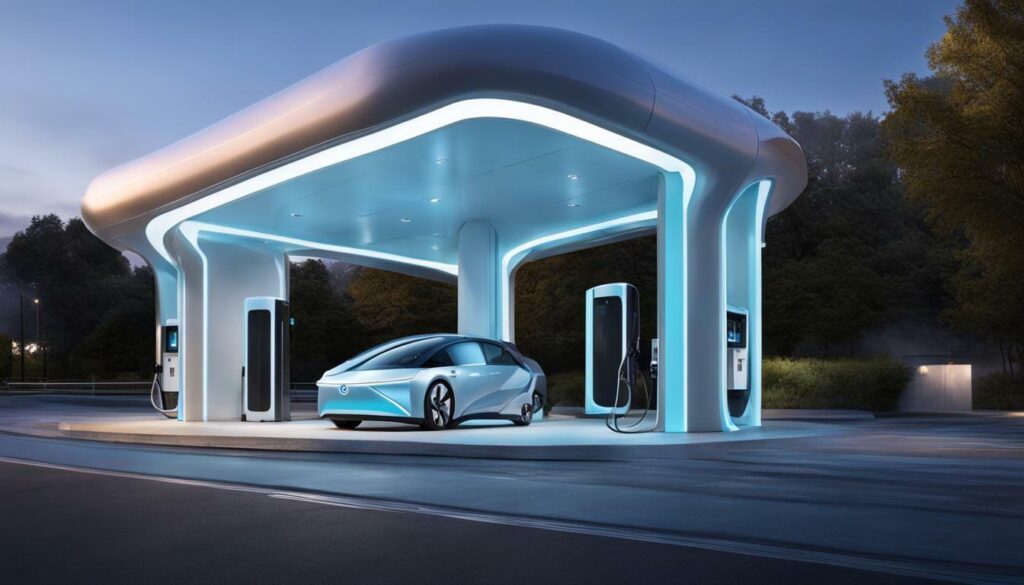
Fast Hydrogen Refueling
Fast hydrogen refueling is the key to eliminating range anxiety and paving the way for efficient and sustainable travel, driving the adoption of hydrogen cars in the future. Hydrogen cars offer numerous advantages, including reduced emissions and a fast refueling time, making them a promising solution to the environmental challenges posed by gasoline and diesel engines. However, the lack of refueling infrastructure and the higher costs compared to electric vehicles have hindered their widespread popularity.
The current status of hydrogen stations in Europe highlights the need for investment in hydrogen refueling infrastructure. With only 172 hydrogen stations in Europe, and Germany leading the market with 69 fueling stations, there is a pressing need to expand the network to support the growing demand for hydrogen cars.
The industry is actively seeking support from the European Union and national governments to address these challenges. Government investment in hydrogen refueling infrastructure is crucial to overcome range anxiety and drive the sales of hydrogen cars. The advancements in hydrogen refueling technology, including high-speed refueling solutions, also hold promise for further enhancing the convenience and efficiency of refueling hydrogen cars.
Despite the challenges, hydrogen cars offer a sustainable and emission-free transportation option. The environmental advantages and fast refueling time make hydrogen cars an attractive alternative to traditional fuel-powered vehicles. With continued support, investment, and technological advancements, hydrogen cars have the potential to play a significant role in reducing emissions and transforming the future of transportation.
FAQ
What is the current status of hydrogen fueling stations in Europe?
Currently, there are 172 hydrogen stations in Europe, with Germany leading the market with 69 hydrogen fueling stations.
Why are hydrogen cars facing challenges in Europe?
Hydrogen cars in Europe are facing challenges due to the lack of sufficient refueling stations, causing range anxiety and hindering sales.
What is the industry doing to address the lack of hydrogen refueling infrastructure?
The industry is seeking support from the European Union and national governments to invest in hydrogen refueling infrastructure.
What are the advantages of hydrogen cars?
Hydrogen cars offer reduced emissions from gasoline and diesel engines and have a fast refueling time.
How do hydrogen cars compare to electric vehicles?
Hydrogen cars face higher costs compared to electric vehicles, which hinders their popularity.
How can hydrogen refueling infrastructure impact sales of hydrogen cars?
The availability of hydrogen refueling stations can alleviate range anxiety for potential buyers and increase the adoption of hydrogen cars.
What is the promise of hydrogen cars for emission reduction?
Hydrogen cars have the potential to significantly reduce emissions from gasoline and diesel engines, contributing to sustainable transportation.
What is the future of hydrogen refueling technology?
Advancements in hydrogen refueling technology, including high-speed refueling solutions, can further improve the convenience and efficiency of refueling hydrogen cars.
